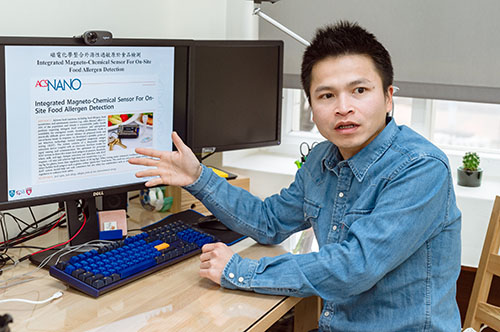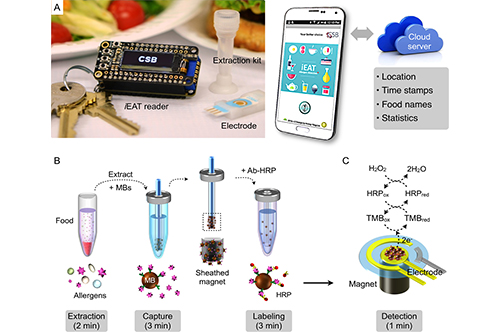The Secret Weapon for Food Testing: The Portable Allergens Testing Device iEAT Developed by Dr. Huang Chen-Han

Sponsored by the Graduate Student Study Abroad Program (GSSAP) established by the Ministry of Science and Technology (MOST), Dr. Huang Chen-Han, Assistant professor of the Department of Biomedical Sciences and Engineering at NCU, visited the top medical schools and institutes of the world—Harvard Medical School (HMS) of Harvard University and Massachusetts General Hospital (MGH) to conduct research, developing the integrated Exogenous Antigen Testing (iEAT), the medical device for allergens detection in the Internet of Things. The iEAT can be used to ensure food safety and further be applied to detection of early-stage cancers and organ transplantation rejection. Several articles have been published in the prominent journal ACS Nano of the American Chemical Society (ACS).
In addition, Dr. Huang and his team applied the iEAT to other medical aspects. Based on the idea of the iEAT, they further developed the portable detection devices such as iKEA and piMEX and applied those devices to clinical medicine, including infections, cancer, organ transplantation, and long-term care services. The devices aim to support patients to perform in-house self-inspections and transmit the data to the hospitals in order to better control the disease progress. The experimental result was published in ACS Nano, Science Advances, and other scientific journals.
Dr. Huang Chen-Han transfers from mechanical control into optoelectric physics, and now he specializes in biomedical research. “The key to conducting transdisciplinary research is the solid fundamental knowledge. With that solid fundamental knowledge, you are capable of communicating with professionals from different fields. Different disciplines have a lot in common. Once you put the very first step out, a different discipline would not be that difficult as it seems. The most important thing is to keep your enthusiasm and curiosity and do the things you are interested in. As you keep delving deeply, life could always give you something unexpected and exciting,” said Dr. Huang.




